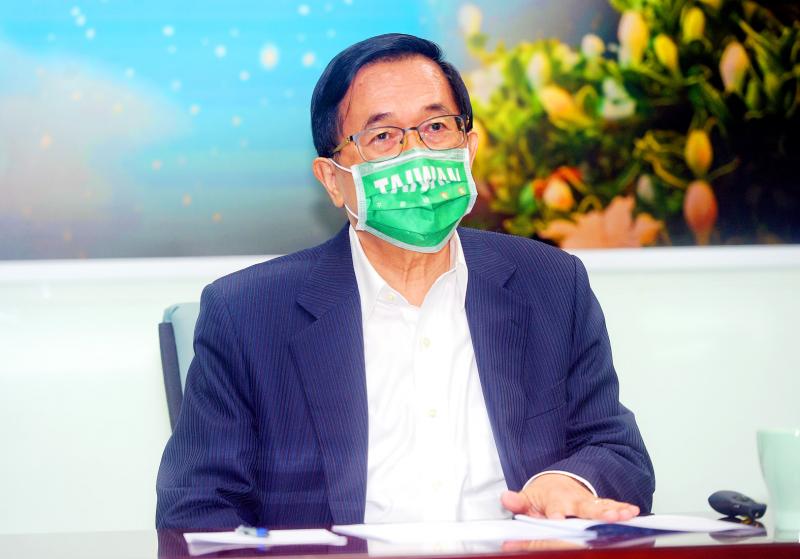The High Court yesterday acquitted former president Chen Shui-bian (陳水扁) of charges related to his personal use of state funds following a recent change to the Accounting Act (會計法), while his wife and son were sentenced on bribery charges.
In its second retrial ruling, the High Court dismissed all charges against Chen, his wife, Wu Shu-jen (吳淑珍), and his close aides relating to the former president’s use of Presidential Office funds from 2000 to 2008.
The judgement was made in accordance with a contentious May amendment to Article 99-1 of the Accounting Act, which makes the personal use of such funds legal and absolves officials of liability for its improper use prior to Dec. 31, 2006, the court said.

Photo: Chang Chia-ming, Taipei Times
The amendment, which was pushed through the legislature by the Democratic Progressive Party and came into effect last month, expanded the exemption of punishment for the misuse of special allowance funds to include state affairs funds available to the president.
Chen was first indicted on charges of corruption, forgery and money laundering in 2008, with prosecutors accusing the now-71-year-old of misusing a total of NT$104 million (US$3.47 million) from the state affairs fund for personal use.
Chen has maintained his innocence, saying that the fund was used to promote confidential diplomatic missions, including paying a US lobbying firm, supporting pro-Taiwan democracy parades, and sponsoring democracy advocates and groups.
The case is one of several corruption scandals that Chen became embroiled in after leaving office.
In 2010, he was sentenced to about 20 years in jail for accepting bribes in a land deal in Taoyuan and other cases.
Chen was released on conditional medical parole in 2015.
The High Court yesterday found Wu guilty of money laundering in a separate case and sentenced the 69-year-old to two years in prison.
The court said that Wu had instructed her son, Kaohsiung City Councilor Chen Chih-chung (陳致中), and daughter-in-law, Huang Jui-ching (黃睿靚), to place the money she received from bribes relating to the land deal and the construction of Taipei Nangang Exhibition Center into overseas bank accounts.
Wu, who was a legislator from 1987 to 1990, was previously sentenced to 17-and-a-half years in prison for bribery and other charges in 2010. She has yet to serve time in jail due to health issues.
Chen Chih-chung was sentenced to one year in prison yesterday and fined NT$1.5 million for his involvement in the money laundering case, while Huang was given four years’ probation and fined NT$1 million.
The sentences can be appealed.

‘DENIAL DEFENSE’: The US would increase its military presence with uncrewed ships, and submarines, while boosting defense in the Indo-Pacific, a Pete Hegseth memo said The US is reorienting its military strategy to focus primarily on deterring a potential Chinese invasion of Taiwan, a memo signed by US Secretary of Defense Pete Hegseth showed. The memo also called on Taiwan to increase its defense spending. The document, known as the “Interim National Defense Strategic Guidance,” was distributed this month and detailed the national defense plans of US President Donald Trump’s administration, an article in the Washington Post said on Saturday. It outlines how the US can prepare for a potential war with China and defend itself from threats in the “near abroad,” including Greenland and the Panama

The High Prosecutors’ Office yesterday withdrew an appeal against the acquittal of a former bank manager 22 years after his death, marking Taiwan’s first instance of prosecutors rendering posthumous justice to a wrongfully convicted defendant. Chu Ching-en (諸慶恩) — formerly a manager at the Taipei branch of BNP Paribas — was in 1999 accused by Weng Mao-chung (翁茂鍾), then-president of Chia Her Industrial Co, of forging a request for a fixed deposit of US$10 million by I-Hwa Industrial Co, a subsidiary of Chia Her, which was used as collateral. Chu was ruled not guilty in the first trial, but was found guilty

DEADLOCK: As the commission is unable to forum a quorum to review license renewal applications, the channel operators are not at fault and can air past their license date The National Communications Commission (NCC) yesterday said that the Public Television Service (PTS) and 36 other television and radio broadcasters could continue airing, despite the commission’s inability to meet a quorum to review their license renewal applications. The licenses of PTS and the other channels are set to expire between this month and June. The National Communications Commission Organization Act (國家通訊傳播委員會組織法) stipulates that the commission must meet the mandated quorum of four to hold a valid meeting. The seven-member commission currently has only three commissioners. “We have informed the channel operators of the progress we have made in reviewing their license renewal applications, and

A wild live dugong was found in Taiwan for the first time in 88 years, after it was accidentally caught by a fisher’s net on Tuesday in Yilan County’s Fenniaolin (粉鳥林). This is the first sighting of the species in Taiwan since 1937, having already been considered “extinct” in the country and considered as “vulnerable” by the International Union for Conservation of Nature. A fisher surnamed Chen (陳) went to Fenniaolin to collect the fish in his netting, but instead caught a 3m long, 500kg dugong. The fisher released the animal back into the wild, not realizing it was an endangered species at